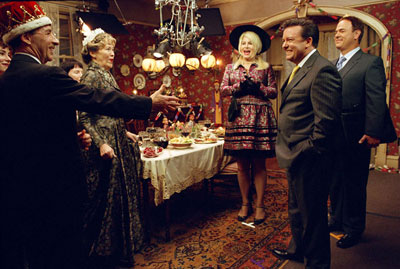2006, huh? Done and gone, you say? Would it be wrong to say good riddance? It was a good year for Black Sheep but not a great year for film. Before September rolled around, I thought we were doomed. I had only caught a handful of enjoyable films and been subjected to heaps of mediocrity. Enjoyable times but forgettable ones. Luckily, a few surprises came through in the fall quarter, making this yearend list possible (for a while I didn’t think it was going to happen).
Last year around this time, I had only been reviewing films for a few months. I’ve now banked an entire year’s worth of reviews that are being read by hundreds of strangers every month. It’s a beautiful progression and I thank you all for reading and showing your support.
I’ve been cramming so many movies in this last week and I’m happy to bring you … BLACK SHEEP’S BEST OF 2006. Before you get to the results, I’ll preface by saying that I try my darndest to see as many movies as I could but ’m not a professional with time to see everything that hits the theatres, I can’t see everything. I tend to avoid films I know I won’t like so this list is based on a long list of films I took chances on. I saw over 70 new movies in 2006 and I give you my favorites in all the regular categories. I’ve also added a category or two and tweaked others. This year, the screenplay category has been broken up into adapted and original. The best independent film has been changed to the Best Little Think Piece … the nominations there represent some of the smaller films of the year that speak volumes despite their small frames. And finally, I’ve also introduced an animation category, which I’ve named, The Trevor Adams Animated Feature Award, after my friend / roommate / business partner. He is a talented animator that makes me watch more animated features than I normally would.
Just like last year, I’m announcing my nominees two days before the Academy announces theirs and I will announce the winners two days before the Oscars are televised. Regular Black Sheep reviews will start back up in a couple of weeks. I think I need a tiny break because all these movies are starting to look the same. Enjoy the rest of awards season and here’s hoping the Academy doesn’t screw everything up this year like they did last.
Happy 2007!
BEST POPCORN MOVIE
- Borat: Cultural Learnings of America for Making Benefit Glorious Nation of Kazakhstan
- Casino Royale
- The Departed
- Dreamgirls
- V for Vendetta
BEST LITTLE THINK PIECE
- Death of a President
- Half Nelson
- Hard Candy
- Little Children
- Little Miss Sunshine
THE WORST FILM I SAW ALL YEAR
- Bon Cop, Bad Cop
- For Your Consideration
- Idlewild
- The Omen
- Sorry, Haters
THE TREVOR ADAMS ANIMATED FEATURE AWARD
- Cars
- Happy Feet
- Monster House
BEST SUPPORTING ACTOR
- Alan Arkin, Little Miss Sunshine
- Jackie Earle Haley, Little Children
- Djimon Hounsou, Blood Diamond
- Eddie Murphy, Dreamgirls
- Michael Sheen, The Queen
BEST SUPPORTING ACTRESS
- Cate Blanchette, Notes on a Scandal
- Shareeka Epps, Half Nelson
- Jennifer Hudson, Dreamgirls
- Rinko Kikuchi, Babel
- Meryl Streep, The Devil Wears Prada
BEST ADAPTED SCREENPLAY
- Borat: Cultural Learnings of America for Making Benefit Glorious Nation of Kazakhstan, Sacha Baron Cohen, Anthony Hines, Peter Baynham, Dan Mazer, Todd Phillips
- The Departed, William Monahan
- Little Children, Todd Field and Tom Perrotta
- Notes on a Scandal, Patrick Marber
- The Painted Veil, Ron Nyswaner
BEST ORIGINAL SCREENPLAY
- Babel, Guillermo Arriaga
- Half Nelson, Anna Boden and Ryan Fleck
- The Queen, Peter Morgan
- Stranger than Fiction, Zach Helm
- United 93, Paul Greengrass
BEST ACTOR
- Sacha Baron Cohen, Borat: Cultural Learnings of America for Making Benefit Glorious Nation of Kazakhstan
- Aaron Echkart, Thank You for Smoking
- Ryan Gosling, Half Nelson
- Will Smith, The Pursuit of Happyness
- Forest Whittaker, The Last King of Scotland
BEST ACTRESS
- Judi Dench, Notes on a Scandal
- Maggie Gyllenhaal, Sherrybaby
- Helen Mirren, The Queen
- Naomi Watts, The Painted Veil
- Kate Winslet. Little Children
BEST DIRECTOR
- Clint Eastwood, Letters from Iwo Jima
- Stephen Frears, The Queen
- Paul Greengrass, United 93
- Alejandro Gonzalez Inarritu, Babel
- Martin Scorcese, The Departed
BEST PICTURE
- The Departed
- Letters from Iwo Jima
- Little Children
- The Queen
- United 93


























